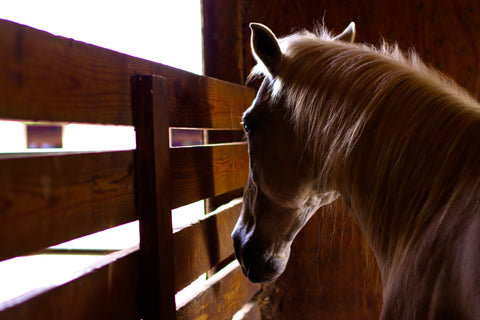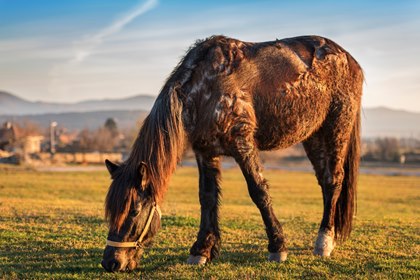One of the most substantial benefits of adding US Chia seeds to your horse's diet is the promotion of optimal gut function. US Chia seeds help your horse's digestive tract by soothing and prevent ulcers, balancing blood sugars, and preventing colic. Properly caring for your horse's digestive tract will maximize the nutrient absorption from forage, feed, and other supplements or medications. This ensures that time and money spent providing quality nutrition for you horse is not spent in vain.

Ulcers are a common problem for many types of horses. Studies have shown that there is a strong association of thoroughbred and standardbred race horses and ulcers, and a relatively strong association of performance and pleasure horses currently having, or having had ulcers (Bell et al., 2007). In fact, horses that don’t show clinical signs of gastric ulcers may still be affected, even if they are not in an intensive work program (Luthersson et al. 2009). It is estimated that almost 50% of foals and 1/3 of adult horses confined in stalls may have mild ulcers. Additionally, up to 60% of performance and show horses, and up to 90% of race horses will develop mild to severe ulcers at some point throughout their lifetime.
By definition, ulcers are an open sore on an external or internal surface of the body, caused by a break in the skin or mucous membrane that fails to heal. Ulcers in horses are most commonly gastric ulcers found in the horses stomach. Ulcers cause stomach pain, often resulting in a horse going “off feed.” This reduction in dietary intake may cause weight loss and nutrient imbalance. With less forage (and therefore, saliva) to help buffer stomach acid, ulcers may become worse or at the very least prevent your horse from consuming their normal diet.
When soaked, chia seeds have a mucilaginous nature, a naturally occurring, gel-like substance found in most plants. Mucilage is often used in medicine to help soothe the pain and inflammation associated with gastric ulcers, by forming a protective barrier on the mucosal surface (Borelli and Izzo, 2000). Clinical data in horses is limited, but mucilage is non-toxic and a safe component of chia seeds.
Large meals that are low in fiber or feeding less frequent meals can be harmful to a horse’s digestive tract. Horses are constantly producing stomach acid, but only produce enough saliva to neutralize the acid when they are chewing. Thus, horses that are able to continuously consume grass or hay have a constant, natural acid buffer provided by forage and saliva. US Chia seeds are also high in fiber, which helps to slow the passage of food through the digestive tract allowing more time for the buffering of acid. It is important to note that chia seeds are not a medical treatment for horses with ulcers; rather a helpful additive in the prevention of ulcers.
For a deeper perspective of ulcers and treatment, check out this article written by Dr. Kerry Ridgeway.

Many horses suffering from diseases such as Pituitary pars intermedia dysfunction (PPID) or Equine Cushing's Disease, Equine Metabolic Disorder or Insulin Resistance derive great benefits from US Chia seeds. Chia seeds have become a more common dietary supplement for human diabetes patients because of it’s ability to stabilize blood sugars and it's near absence (less than 5%) of non-structural carbohydrates (NSC) . Chia seeds have a similar effect in horses.
As chia seeds pass through the horse's digestive system, the seeds become a mucilage consistency, which slows the digestive enzyme's breakdown of carbohydrates. Many horses are on a grain-based diet that ravels through the digestive tract much faster than forage. By better slowing down the metabolism, blood sugar spikes and the associated stress on the horse's system will be greatly reduced. Additionally, US Chia seeds are high in magnesium and omega oils (which many IR horses are deficient in), and contain almost no starches or sugars.
PPID tends to affect most horses as they age, generally due to oxidative stress that can oftentimes be caused by exposure to mental and physical challenges, chemicals in the environment, and a diet low in antioxidants. Free radicals target dopamine-releasing neurons in the brain, leading to the onset of PPID. The Omega-3 fatty acids and antioxidants in US Chia seeds reduce free radical information and counteract the predisposition and severity of the disease.
Although US Chia seeds are not a cure for horses suffering from metabolic disorders, many of our customers have seen vast improvement in their horses with various conditions by incorporating US Chia seeds into their diets.

As horse owners, we know that colic is not to be taken lightly. Although we hope to not have to expreience it firsthand, colic can be unavoidable. US Chia seeds are not a cure for colic however, many of our customers have been able to reduce, or completely eliminate chronic colic in their horses by incorporating US Chia seeds into their diet. Chia seeds are 40% fiber and have a high concentration of soluble fiber (27%) – more than wheat, oats or flax. The fiber in US Chia seeds can absorb 10-12 times their weight in water, which increases fullness in horses that are prone to overeating. Additionally, The fiber in chia seeds feed friendly bacteria in the intestine that promote healthy gut health.
Chia seeds are hydrophilic (water absorbing) meaning when exposed to moisture, chia seeds form a mucilage-type gel that supports digestive motility. The gel helps to pass sand and food through the gut, preventing impactions down the road. The hydrophilic quality of chia seeds also increases your horses hydration levels. Keeping your horse hydrated is important for preventing colic throughout the year and for helping to keep the digestive tract moving normally.
"I read that chia seeds can help remove sand from the digestive system and gave it a try. He ate the seeds without hesitation. Both I and my vets have done a “sand test” since then and no sand shows up. I also like the additional health benefits that chia seed offers.” - Margaret, NJ
“She is insulin resistant, has hind gut ulcers, was very cresty and colicky despite being on grass hay only and low starch metabolic pellets. I started her on chia seeds about two months ago and noticed quite an improvement over several weeks. She has been colic free for about 6 weeks now, has lost weight and her belly and is not as cresty as she was.” - Ginette on her 16 year old mare, AZ